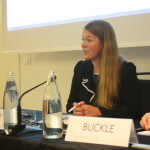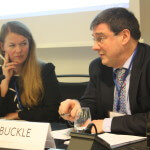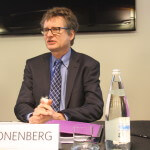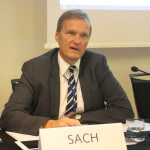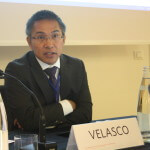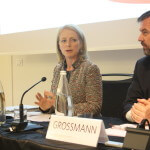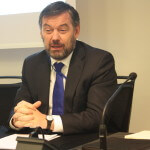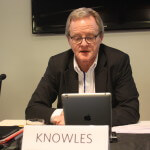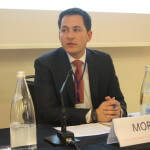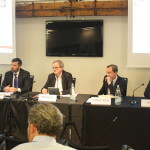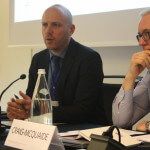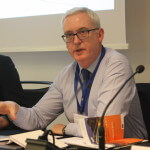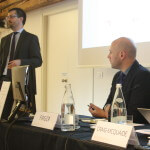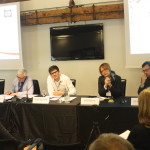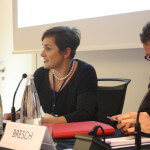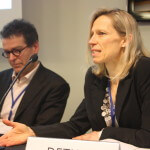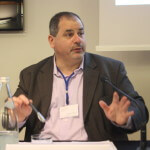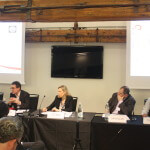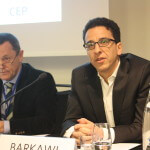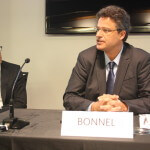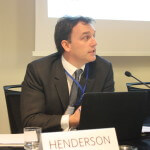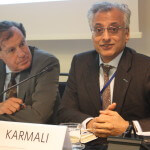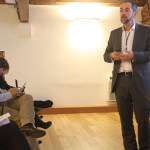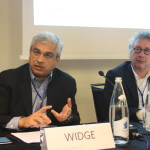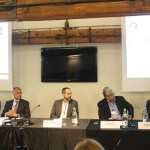Organized by Climate Policy Initiative (CPI) in collaboration with the World Bank Group, China Light Power (CLP) and the Organisation for Economic Co-operation and Development (OECD), the Fifth Annual Meeting of the San Giorgio Group was held over one and a half days on the Island of San Giorgio Maggiore in Venice.
The San Giorgio Group assembles key financial intermediaries and institutions actively engaged in green, low-emissions finance.
For further information on the San Giorgio Group, please contact: admin@cpivenice.org.
Thursday, 25 February 2016
Welcome
Thomas Heller, Executive Director, Climate Policy Initiative
Introductory Panel: Tracking & Politics
The introductory session focused on developments, milestones and challenges that have impacted information about and progress on global climate financing over the past year. Panelists discussed possible implications of the Paris Agreement on climate financing up to and beyond 2020, and identified areas where technical work to improve information flows and the design of policies and financial instruments could further build the political willingness and ability of countries and investors to take ambitious, early climate action. Panelists provided insights on how better information about finance and the landscape of actors could enhance participation in the implementation of NDCs, and what needs to be done now to continue the momentum of COP21.
Chair: Barbara Buchner, Senior Director, Climate Policy Initiative
Panelists:
- Simon Buckle, Head of Climate Change, Biodiversity and Water Division, Environment Directorate, OECD
- Carel Cronenberg, Principal MRV Manager, Energy Efficiency and Climate Change Team, European Bank for Reconstruction and Development
- Karsten Sach, Deputy Director General “European and International Policy”, Federal Ministry for the Environment, Nature Conservation, Building and Nuclear Safety, Germany
- Yolando Velasco, Manager, Finance, Technology and Capacity-Building Programme, UNFCCC Secretariat
- B. Buchner
- S. Buckle
- C. Cronenberg
- K. Sach
- Y. Velasco
Panel: Different Niches for Different Actors? Does Specialization Help or Hinder Efforts to Scale Up?
The climate finance landscape and accompanying architecture is rapidly growing and changing. New institutions like the Green Climate Fund are increasingly operational; public financial institutions from across the globe have signed onto new principles to integrate climate change into their financing and operations; and private finance institutions such as large corporate banks have made meaningful commitments to boost their investments in clean energy, green bonds, sustainable agriculture and more. In light of this growing supply of finance, this session explored what role various climate finance institutions are currently playing, and what adjustments might help ensure the overarching climate finance architecture is more coherent and fit for purpose. Panelists discussed what they see as their institution’s comparative advantage in this space and how the various pieces of the climate finance puzzle fit together.
Chair: Jane Ebinger, Managing Director, Policy and Knowledge, Sustainable Energy for All (SE4All)
Panelists:
- Christian Grossmann, Director, Climate Change, International Finance Corporation, The World Bank Group
- Christopher Knowles, Head of Climate Change and Environment Division, European Investment Bank (EIB)
- Roland Sundstrom, Climate Change Specialist, Programs Unit, Global Environment Facility (GEF)
- Stephen Morel, Climate Finance Specialist, Overseas Private Investment Corporation
- J. Ebinger
- C. Grossmann
- C. Knowles
- S. Morel
Panel: How Can Finance Help Cities Address Climate Change?
Cities are key drivers of greenhouse gases emissions and vulnerability. In a rapidly urbanizing world, the way in which cities develop will play a major role in determining the success of climate change mitigation efforts and the degree to which climate change impacts those billions at risk from its harmful impacts. Especially in developing countries, the ability of cities to develop and finance urban low-carbon and climate-resilient development plans is constrained by, inter alia, lacking expertise, inadequate regulatory frameworks, and limited access to finance. International public climate finance and philanthropic initiatives have the potential to help municipal governments and other urban actors to overcome such barriers. Panelists shared insights on existing initiatives and discussed options for bridging the urban climate finance gap.
Chair: Daniel M. Firger, Environment Programme, Bloomberg Philanthropies
Panelists:
- James Alexander, Head, Finance and Economic Development Initiative, C40 Cities Climate Leadership Group
- Peter Craig-McQuaide, Founder, Head of Unit, Sustainable Energy and Climate Change, International Cooperation and Development, European Commission
- Silvie Kreibiehl, Head of FS-UNEP Collaborating Centre for Climate & Sustainable Energy Finance, Frankfurt School of Finance and Management GmbH
- Michael Schneider, Impact Entrepreneur and Member of the Supervisory Board of GRIPS AG Energy Service Company
- D. M. Firger
- P. Craig-McQuaide
- M. Schneider
Panel: Finance, Risk and Vulnerability
Agribusinesses and corporations have begun to recognize their exposure to climate change risks in their supply changes and business operations. Building the business case for change includes understanding physical, financial and technical risks and vulnerabilities on one side, amid growing calls for traceable and sustainable supply chains. A growing number of corporations have announced ambitious commitments to increase sustainability and improve livelihoods. However, implementing these can be challenging and expensive, and often involves integrating highly diverse groups of small holders into business operations. Panelists discussed how new financial instruments and products can blend public and private finance in ways that can help to share risks and costs across multiple stakeholders, reduce negative environmental impacts and improve agricultural productivity.
Chair: Jane Wilkinson, Director, Climate Policy Initiative
Panelists:
- David Bresch, Head Business Development GP and Director, Global Partnerships, Swiss Re
- Annette Detken, Head of Division Competence Center, Financial Sector, KFW Bankengruppe
- Joshua Sawislak, HAICP, Global Director of Resilience, AECOM
- Kindy Rinaldy Syahrir, Head of International Cooperation and Climate Change Financing Unit, Ministry of Finance, Indonesia
Presentation: Financial Instruments and Products to Mobilize Public and Private Finance: Economic Instrument for Environment in Indonesia
- J. Wilkinson
- A. Detken
- J. Sawislak
Social Dinner
Dinner remarks on The Paris Agreement and its implications on the investment community
- Howard Bamsey, Honorary Professor, Australian National University (ANU) and former Deputy Secretary of Australia’s Department of Climate Change and Energy Efficiency, and Australia’s Special Envoy on Climate Change
Friday, 26 February 2016
Panel: Will Financial Policy and Regulation Help or Hinder Efforts to Scale up Climate Finance?
In the lead up to the Paris Agreement, the investment community signaled their willingness to be a part of the solution with the announcement of numerous investment targets, mandates and strategies to support climate finance. This panel considered how the outlook for financial policy and regulation, with its overarching focus on stability of the financial system, may help or hinder efforts to mobilize long-term climate finance. Can the recently announced G20/FSB Task Force on Climate-related Financial Disclosures result in net positive flows to climate solutions? What will be the implications for the work of credit rating agencies and index providers? Will Basel III or Solvency II guidance be recalibrated to reduce any negative impact on infrastructure investments? The session concluded by considering what central banks and regulators could do to support capital allocation to climate solutions.
Chair: Simon Upton, Director, Environment Directorate, OECD
Panelists:
- Alexander Barkawi, Founder and Director, Council on Economic Policies
Presentation: Expanding Green, Low-Emissions Finance - Alexis Bonnel, Deputy to the Director, Cross-Operations Department, Agence Française de Développement (AFD)
Presentation: Mainstreaming Climate Action Within Financial Institutions - Iain Henderson, G20 Green Finance Study Group Project Manager, UNEP Finance Initiative
- Karsten Löffler, Managing Director, Allianz Climate Solutions
- S. Upton, A. Barkawi
- A. Bonnel
- I. Henderson
Concluding Panel: Deal Makers – The Role of Innovative Financial Tools in Scaling Up?
While most recent data shows an increase in global climate finance flows, they remain far below even the most conservative estimates of financing needs for a pathway to a 2 degree future. This session focused on innovative instruments that will foster climate investments, and that can help finance the implementation of Nationally Determined Contributions (NDC). What elements do new instruments need to incorporate to ensure that they are actionable and replicable at scale? Panelists highlighted how different financial instruments can target private capital to support foreign investments. The session will conclude by providing an outlook on necessary next steps to finance the implementation of the Paris Agreement and contribute to bridging the investment gap.
Chair: Thomas Heller, Executive Director, Climate Policy Initiative
Panelists:
- Abyd Karmali, Managing Director, Climate Finance at Bank of America Merrill Lynch
- Harald Hirschhofer, Head of Research, TCX – The Currency Exchange Fund
Presentation: Shared Commitment to Local Currency - Vikram Widge, Head, Climate and Carbon Finance, International Finance Corporation (IFC), The World Bank Group
- Alexander Voigt, Renewables Pioneer and CEO of GRIPS AG Energy Service Company
Closing of the meeting by Thomas Heller, Executive Director, Climate Policy Initiative.
- T. Heller, A. Karmali
- H. Hirschhofer
- V. Widge, A. Voigt
Click here to read a blog summarizing discussions at this San Giorgio Group event from Ari Huhtala, Deputy CEO – Policy and Programmes for CDKN: http://cdkn.org/2016/02/opinion-follow-paris-agreement-with-green-investment-deals/





